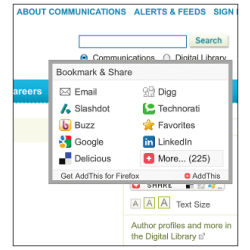Numbers give meaning to the promises on the Communications Web site to deliver timely, substantive content that complements the magazine's peer-reviewed material and makes Communications a valued component of ACM membership.
David Roman
The world of Communications is not contained in the pages of a monthly magazine. Like other publications, it has expanded over time into a variety of electronic formats for members and readers. Each format delivers something its counterparts do not.
The most popular content on Communications' site is something many readers know nothing about.
The mouse's days are numbered. Computer interfaces that remove user-system barriers are in the works and are intuitive enough for first-time users to throw away the manual.
Computer scientists are wrestling to tame the glut of online data, which is overwhelming both individuals and companies. For some users the answer starts with restrictions, but restrictions won't solve the problems of an overconnected world.
Communications' site performs ably on today's leading mobile systems. However, support for these and other mobile devices will be improved.
Almost 90% of what we learn comes from reading, estimates say, and the path that online information takes to your brain is less direct than most. The Communications Web site gets most of its readers from someplace else: 56.6% from referring sites, like Slashdot or Reddit, and 14.3% from search engines. Google alone sends 13.6%.
The vast Internet delivers only a sliver of the information the average American consumes each day, according to a recent report by the University of California, San Diego (http://hmi.ucsd.edu/howmuchinfo_research_report_consum.php).
The unfilteredness of the Internet, while largely considered a plus, is taking some knocks. Abundant, easily accessible data sits side by side with "rumors, lies, and errors," and the victim is science, according to Michael Specter.
Crowdsourcing and the Question of Expertise
There is an in inherent weakness to crowdsourcing that should bother computer scientists and computer users alike. It's the fact there is no clear difference between "the wisdom of the crowd" and "the mob that rules." What's missing is a measure of discernment.
Shape the Future of Computing
ACM encourages its members to take a direct hand in shaping the future of the association. There are more ways than ever to get involved.
Get Involved








